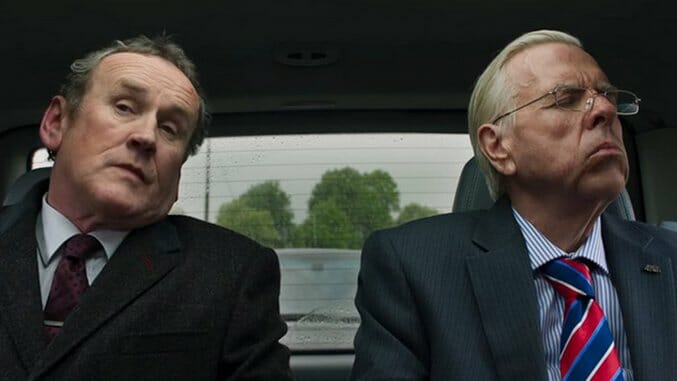
There are no particular rules to follow in a road movie—just established expectations. The main priority of a road movie: Characters driving together, for however long, must end their cramped time in a different place then where they left—both geographically and philosophically—precipitating some form of resolution or greater understanding. A few obstacles will test wills, threaten discord and ultimately become small matters to look back upon. There will be laughs, arguments and plenty of warranted vulgarities, in rage and bewilderment. Directors and writers have worn out their tires on these tropes, but they have the ability to remain comforting, safe and reliable, even in the slipperiest of plot conditions.
That’s probably why Nick Hamm and writer Colin Bateman decided to imagine the negotiation of the 2006 St. Andrews Agreement, between Irish Democratic Union Party leader Ian Paisley and Sinn Féin politician Martin McGuinness, taking place inside a car. Or, more specifically, inside a van being driven by an MI5 agent under surveillance by British Prime Minister Tony Blair and his team, looking to broker peace for Northern Ireland after decades of violent turbulence. The result is a well-acted, well-reasoned two-hander that struggles to swerve around the contrivances of the genre.
The buildup to this action is where the The Journey starts, in a hotel lobby where Paisley (Timothy Spall) and McGuinness (Colm Meaney) stand at opposite ends sharing a brief stare-down above a drumming soundtrack, which builds to accentuate their 30-year lack of communication, before meeting in their separate chambers. Paisley needs to leave that night to celebrate his golden wedding anniversary, but a storm has shut down nearby Glasgow Airport. Blair (Toby Stephens) and the British government offer to fly him by private jet if he’s willing to drive to Edinburgh instead, but only under a longstanding provision that McGuinness should join, lest there be any attempt at assassination.
That kind of clause seems rather silly at this point in these old men’s lives, but also provides a window into the leadership and historical significance to their respective parties. After some snarling, Paisley agrees, and the movie spins its wheels trying to establish a dialogue between the two foes. McGuinness asks if Paisley, a supremely religious man, has seen a Samuel L. Jackson movie recently. Paisley hasn’t seen a movie in theaters since 1973, which McGuinness guesses was The Exorcist. This kind of humor often works in a buddy cop vehicle or something like The Trip, which relies heavily on its comedic stars trading banter, as funny as it is painful. But these men are not comedians, and once The Journey figures that out, the conversations turn more serious and more involving.
That’s not to say both can’t laugh at each other. Spall gives Paisley a chuckle that sounds like a dog wheezing, the most emotive expression for a man devoted to his Protestant lifestyle. His coarse accent and sneering, which has considerably eroded since his once prominent time at the podium, suggests a weaker man underneath his conservative, slicked-back white hair appearance. He claims not to have blood on his hands, and most of his insults towards McGuinness, whom Meaney gives a warmer, conciliatory countenance, regard the incessant impracticality of his party’s bombings and violence.
Feeding the driver (Freddie Highmore) with directions to prolong this trip is Harry Patterson, one of John Hurt’s final roles, who breathes into the surveillance room that it will be the younger generations that ultimately determine how this age-long war of attrition ends. And so this trip, between leaders with large followings and bigger ideas, starts to evolve from differences to commonalities, about reckoning with past actions and considering future legacies. Politics is business, but it can increasingly become personal, something Paisley and McGuinness realize can have its own merits, especially when their van blows a tire in the middle of the forest and a nature walk is in order.
One of the more contentious topics over which they argue remains the distinction between war and murder. Can McGuinness actually sleep at night knowing the atrocities committed by his paramilitary groups? Can Paisley accept his counterpart’s explanation for the innocent lives lost, for the attacks that persisted for so long under a united cause? An allusion to September 11, the movie’s sharpest point, puts these questions into greater relief, partly by exposing the triviality of their sides’ tireless dispute over continued, perilously small attacks and their significance to achieving victory.
That we know how this particular discussion ends (what will lead to The Northern Ireland Executive) doesn’t lessen the impact of the two eventually extending a firm handshake, but it does make us more aware about when and how some of these existential breakthroughs occur. In other words, the filmmakers have thought that pairing up two rivals inside a van, and adding some stumbling blocks to their bickering, might texture and spruce up this accord, to give us more insight into these men. It could have worked. What they didn’t consider is that perhaps these conversations were just as, or even more, ferocious, amenable and riveting as stationary, face-to-face negotiations.
Director: Nick Hamm
Writer: Colin Bateman
Starring: Colm Meaney, Timothy Spall, Freddie Highmore, John Hurt
Release Date: June 16, 2017